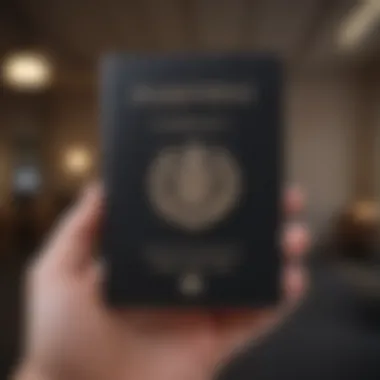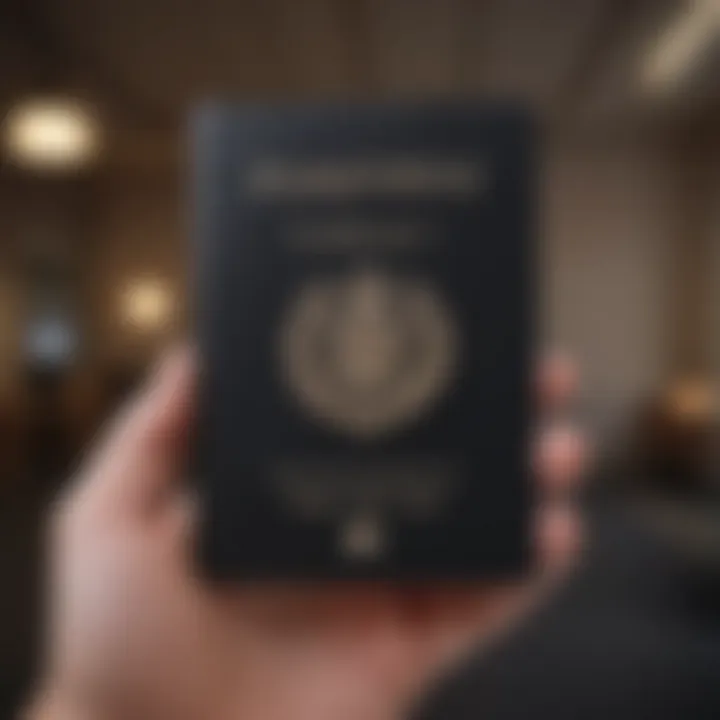Renewing Expired Passports: A Step-by-Step Guide


Intro
Renewing an expired passport can seem daunting, but it does not have to be. Many individuals find themselves in a situation where their passport has lapsed, and the process to renew it can be unclear. Understanding the steps and requirements is crucial for a smooth renewal experience. This guide will walk you through the essentials of renewing your expired passport and provide practical insights to ease the process.
When a passport expires, it can impact travel plans significantly. Imagine having the perfect vacation planned only to realize your passport is no longer valid. In today’s fast-paced world, being prepared is essential, especially when it comes to travel documentation.
This guide will simplify the complexities of the renewal process, addressing everything from eligibility criteria to documentation needed. If you navigate this process correctly, you can avoid unnecessary delays and frustrations, allowing you to focus on what truly matters—your journey.
Coverage Options
While "coverage options" typically implies insurance, in this context, it can refer to understanding the different aspects surrounding passport renewal. This includes comprehending eligibility for renewal and knowing the mechanisms in place for processing expired passports.
Every passport renewal situation is unique, just like the individuals who hold them.
Types of Coverage Available
When it comes to renewing an expired passport, it is essential to recognize the following scenarios that dictate the type of renewal process you can undertake:
- Renewal within 15 years: If your passport expired within the last 15 years and was issued when you were at least 16 years old, you may opt for a simplified renewal process.
- Expired for more than 15 years: If your passport expired over 15 years ago, you will need to apply for a new passport, which involves a more detailed application process.
- Damaged passports: If your passport is damaged, even if it is still valid, you must replace it through the standard application process.
Liability Coverage Explained
While not directly applicable to passports, understanding the responsibilities associated with holding a passport can be critical. This includes acknowledging the requirement to travel with a valid passport, knowing the implications of using an expired passport, and understanding legal ramifications should you be found in possession of invalid travel documentation.
Even if this discussion aligns more with travel standards, it is pertinent to recognize the accountability placed upon travelers. Your passport is more than just a document; it is a representation of your identity across international borders.
"Renewing an expired passport is not just a paperwork task; it is about being prepared for unforeseen travel opportunities."
Key Considerations
As you approach the renewal process, several important factors deserve thorough consideration. These involve the specific requirements and logistics that will streamline your application.
Factors to Assess When Choosing Renewal Method
- Eligibility: Check if you meet the criteria for a streamlined renewal process based on the age of your expired passport.
- Processing times: Understanding the time involved in processing your renewal can help avoid last-minute hassles, especially if travel is imminent.
- Fees: Different renewal methods come with varying fees. Assess the costs involved to ensure there are no surprises.
Understanding Policy Limits
Most applicants may not think of limits regarding passport renewals, but understanding what is required from you can prevent issues. Familiarize yourself with the following limits:
- Document requirements: Know exactly what documents you need to submit and ensure they are recent and accurate.
- Time limits on renewals: Recognize the difference between an expired passport and the deadlines that might apply to travel plans.
By grasping these considerations clearly, you can considerably simplify your approach to renewing your expired passport. This will allow you to focus more on the travel ahead rather than the complications tied to travel documents.
Understanding Passport Expiration
Passport expiration is a crucial topic for travelers and those needing identification. The relevance of understanding this topic lies in grasping the consequences tied to the expiration date of a passport. It creates a roadmap for managing one’s travel plans effectively and ensures one has the necessary documentation for international travel.
Definition of Passport Expiration
Passport expiration refers to the point at which a passport is no longer valid for travel. Generally, a passport has a specific validity period, often ten years for adults and five years for minors. Once the date expires, the passport cannot be utilized for travel. Moreover, it is worth noting that certain countries require a passport to be valid for at least six months beyond the date of entry. Understanding this definition is important, as it helps individuals avoid potential issues during travel.
Common Reasons for Passport Expiration
Passports can expire for several reasons. Firstly, the most common cause is simply the passage of time. Many passport holders may not realize that their passport has an expiry date and can travel on expired documents if not checked.
Secondly, changes in personal circumstances can affect the validity of a passport. For instance, a name change due to marriage or divorce can necessitate a renewal even if the passport has not technically expired.
Additionally, lost or stolen passports become irrelevant for travel purposes, leading individuals to apply for a new passport altogether.
Important points include:
- Duration of validity depends on age at issuance.
- Travel restrictions in specific countries can result in unexpected issues.
- Personal situations may change, necessitating an update, even if the expiration date has not passed.
"Being aware of passport expiration is essential to avoid disruptions in your travel plans."
Understanding the expiration of passports ensures that travelers can plan their journeys without impediments. It promotes a proactive approach to travel documentation, thus enhancing the overall travel experience.
Eligibility for Passport Renewal
Eligibility for passport renewal is a crucial aspect of navigating the complexities associated with expired passports. Understanding the criteria for renewal helps individuals determine the most appropriate pathway to re-establish their ability to travel internationally. This section clarifies what qualifications must be met, ensuring a structured approach to the renewal process.


Renewal eligibility is not merely about meeting basic criteria; it incorporates understanding the nuances of one's specific situation. Proper awareness of these elements can significantly ease the process, potentially saving both time and monetary resources during the application. Therefore, clarity on eligibility is not just beneficial; it is essential.
Criteria for Renewal
To apply for renewal of an expired passport, applicants typically need to satisfy several criteria. The fundamental requirements generally include the following:
- The passport was issued when the applicant was at least age 16.
- The passport was issued within the last 15 years.
- The applicant's passport was issued in their current name or they can provide legal documentation for a name change.
- The passport is damaged, lost, or expired, but not destroyed.
Understanding these criteria allows applicants to prepare appropriately. For example, if someone faces name changes due to marriage or divorce, having those legal documents readily available can significantly streamline the application process. It is also relevant to note that applicants who do not fit into these specific criteria may still be eligible, but will need to go through the more extensive procedure of applying for a new passport entirely.
Conditions That Require a New Application
In some scenarios, individuals may find that they cannot renew their expired passport through the standard process. Certain conditions necessitate applying for a new passport instead. These can include:
- The passport was issued when the applicant was under 16 years old.
- The passport has been significantly damaged or has missing pages.
- The applicant's passport was issued more than 15 years ago.
- The applicant's appearance has changed significantly and does not match the current passport photo.
It is also important to acknowledge that applicants with restrictions on their passport status, such as those with a lost or stolen passport reported, must approach the renewal process with additional caution. These conditions highlight the complexities that might arise and stress the importance of being well-informed before initiating the renewal process.
"Before starting the renewal process, ensure you fully understand your eligibility. This helps avoid unnecessary complications later."
Recognizing distinctions between renewal and new applications is a vital part of safeguarding one’s time and resources. Comprehending the criteria and conditions sets the groundwork for an efficient journey towards reobtaining a passport.
Required Documentation
Renewing an expired passport involves several key document components that one must duly prepare. Understanding the importance of each document is vital to streamline the renewal process. Failing to submit appropriate documentation can lead to delays or even rejection of the application, underscoring the necessity for meticulous preparation.
Completed Application Form
The first essential document is the completed application form. The U.S. Department of State requires individuals to fill out Form DS-82 if their passport is eligible for renewal. An accurately filled application form is important as it serves as the foundational document for the entire passport renewal. Take care to include all necessary details such as your name, date of birth, passport number, and a signature. A small error here can result in processing delays, so it is prudent to review the form for mistakes before submission.
Proof of Citizenship
Another vital piece of documentation is proof of citizenship. This can commonly be evidenced by presenting a certified birth certificate or a previous passport. Citizenship verification establishes your right to hold a passport. Not all types of documents are acceptable; for instance, a social security card does not substitute for proof of citizenship. Gathering this document in advance can significantly streamline the renewal process.
Identification Requirements
Alongside proof of citizenship, identification requirements include presenting a valid photo ID. This can be a driver's license or a government-issued ID. The photo ID ties your identity to the application and will be used for verification when the passport is issued. Ensure that the ID is not expired; otherwise, it may complicate the application process. Having a clear copy of this document can also be beneficial.
Supporting Photographs
Lastly, passport photographs play a critical role in the renewal documentation. The photograph must meet specific requirements, such as being in color and recent, with a plain white background. Your face must be clearly visible, and no shadows should obscure your features. Since photographs often need to be taken at professional locations to ensure they meet all criteria, plan accordingly to avoid issues later in the application process.
"Submitting the correct documentation is crucial for an efficient passport renewal. Each document must align with specific requirements set by the issuing authority."
In summation, having a complete set of required documentation aids in minimizing hurdles during the passport renewal process. Each document serves its specific purpose, and neglecting any can lead to unnecessary delays or complications.
Application Process for Expired Passports
Understanding the application process for expired passports is crucial for anyone looking to travel internationally. Navigating this process can seem intimidating, especially if it has been years since the last renewal. However, awareness of the specific steps involved can significantly enhance one’s confidence and efficiency in securing a new passport. This section provides clarity on the procedures related to both online and in-person applications, along with a breakdown of associated fees. Doing this will help you plan effectively and avoid potential pitfalls during the renewal journey.
Online Application Submission
Submitting your application online is often the quickest and most convenient method. The online platform is designed to simplify the process and reduce the need for unnecessary paperwork. Most applicants can complete the entire application form digitally, making it easier to input accurate information.
When you apply online, you can expect an intuitive interface that guides you through each required section. Be prepared to upload your supporting documents, such as proof of citizenship and identification. Ensure that you have scanned copies readily available. After submitting your application, you will receive a confirmation email, which is vital for tracking your application status later.
In-Person Application Procedures
For some, visiting a passport office may be unavoidable. In-person applications are usually necessary if there are complications with your documents or if you are applying for a passport book and card simultaneously. Be sure to make an appointment beforehand to minimize waiting time. It's also important to bring all required documents, as failure to do so may result in delays.
During your visit, you will fill out the application form and present your documents to the clerk. They will review everything to ensure compliance with the requirements. This process might feel lengthy, but it provides an opportunity for immediate feedback, which can be beneficial if there are questions or concerns regarding your paperwork.
Fees Associated with Renewal
Understanding the financial aspects of passport renewal is essential for effective budgeting. The fees can vary depending on several factors: type of passport, speed of processing, and age of the applicant. As of now, the standard fee for a passport book renewal is $110. If you opt for expedited service, an additional fee of $60 may apply, reducing processing times significantly.
Furthermore, additional costs can arise if you need to amend any part of your application or require service for different types of passports. It's advisable to keep an eye on the official U.S. State Department's website for the most current fee structure.
Keep in mind that applying online may involve lower fees due to reduced administrative costs.


In summary, whether you choose to apply online or in person, understanding the fees and procedures involved in renewing an expired passport is crucial. These considerations help streamline the renewal process, making your travel plans more attainable.
Processing Times and Expectations
Understanding processing times is a critical aspect when renewing an expired passport. It directly influences your travel plans and overall satisfaction with the application process. Having a clear expectation of how long the renewal will take can reduce anxiety and enable better planning.
Normal Processing Times
Normal processing times for passport renewal can vary based on several factors. Typically, it takes around 10 to 12 weeks for a standard application to be processed. This duration can fluctuate due to demand, staffing, and the specific circumstances affecting the passport agency at any given time. It’s advisable to submit your application well in advance of your intended travel.
Here are points to consider:
- Planning Ahead: If you have upcoming travel, knowing that normal processing could take several weeks is important for making arrangements.
- Potential Delays: Be aware that during peak travel seasons, like summer, the processing may take longer than usual. This underlines the necessity of applying as early as feasible.
- Tracking Applications: Utilizing the official passport agency website allows individuals to track the status of their renewal, keeping them informed throughout the process.
Expedited Service Options
For those who need their passport renewed more urgently, expedited service options are available. Generally, this service shortens the processing time significantly. Under normal circumstances, expedited processing can take about 5 to 7 weeks. However, when immediate travel is necessary, individuals can choose to visit a passport agency in person, potentially receiving their passport the same day, provided appointments are available.
Important details regarding expedited service include:
- Additional Fees: Expedited services come with higher fees. It’s wise to determine if the time saved merits the extra cost.
- In-Person Applications: For urgent requests, visiting a regional passport office may be necessary. This option requires an appointment, which can be secured through the State Department website or via customer service.
- Same-Day Service: For life-or-death emergencies or essential travel, same-day service is available, though conditions apply.
Highlight: Always check the current processing times on the official U.S. State Department website. Staying well-informed can aid in navigating the travel schedule and associated plans.
Being knowledgeable about processing times empowers you to make informed decisions. Whether opting for normal or expedited processing, understanding these elements ensures a smoother experience as you work through the passport renewal process.
Checking Application Status
Checking the status of your passport renewal application is crucial for managing your travel plans and maintaining peace of mind. After you submit your application, waiting for the processing to complete can be stressful. Understanding how to check the status allows you to stay informed about where your application stands in the queue and whether there are any additional steps you need to take.
One major benefit of checking your application status is that it can help you anticipate when your new passport will arrive. This is particularly important if you have upcoming travel plans. By getting real-time updates, you can adjust your plans accordingly, avoid unnecessary stress, and ensure that you have your passport in hand before your departure date. Additionally, knowing the status can alert you to any issues that may have arisen in processing, allowing you to address them promptly.
There are several factors to consider when checking your application status. First, you need to ensure that you have all the necessary information at hand, such as your last name, date of birth, and the application number. Second, it’s essential to choose the method that best suits your needs, as different methods may provide more or less detailed information.
"Staying on top of your application status can save you from last-minute surprises when planning a trip."
Methods to Check Status
There are several methods available for checking the status of your passport renewal application. These include:
- Online Tracking:
- Phone Inquiry:
- Mail Inquiries:
- Email Support:
- Most passport agencies offer an online portal where you can input your information. This is often the quickest way to get updates. Visit the official passport website to begin this process.
- You can call the National Passport Information Center. Have your application details ready to facilitate the process. They can provide general information about processing times and the status of your application.
- If preferred, you can send a written request to your passport processing facility. However, this method is slower and less efficient compared to the other two options.
- Some passport agencies offer email support for status inquiries. Check the agency's website for specific guidelines on how to use this method.
Each method has its own advantages and disadvantages, depending on how urgently you need the information and your personal preferences. It is advisable to use the online method first, as it often yields the fastest results.
What to Do if Your Application is Delayed
Delay in passport renewal applications may create anxiety for individuals planning their travels. Knowing how to address these delays is essential to minimize disruption in your travel plans. Understanding the process makes it easier to navigate any obstacles that may arise when renewing your expired passport. Here, we will discuss specific actions you can take and why they matter.
Contacting Customer Service
If you find that your application is delayed, contacting the customer service of the passport agency is often the first step to take. You can reach them via phone or online. The customer service representatives can provide updates on the status of your application and give you insight into any issues that may be causing the delay.
When you make this call, be prepared with relevant details like your full name, date of birth, and application receipt number. This information helps them locate your records promptly. If they mention missing documents, be ready to discuss what you can do next.
Another option to consider is checking your email for any correspondence. Sometimes agencies will send notifications regarding issues with applications; if this happens, it is prudent to follow their guidance quickly.
Documenting Delays and Issues
Keeping a detailed record of any delays and issues is crucial when dealing with your passport renewal. Start by noting down the date you submitted your application and any additional correspondence you have had with the passport office. This documentation can serve as a reference should you need to escalate your situation.
If you experience delays linked to missing documents, make a list of what documents need to be submitted. Keeping track ensures nothing gets overlooked. You may also want to take screenshots or save emails that outline any specific issues raised by the agency. This documentation can be helpful if you need to follow up or provide proof of your attempts to resolve the situation.


"Effective communication with the passport agency can alleviate stress and streamline the process."
Overall, delays in passport renewal applications can happen for various reasons. By understanding how to contact customer service and maintaining thorough documentation, you can actively work towards resolving issues. The more organized you are, the better chance you have of a smooth renewal process.
Common Issues and Solutions
Navigating the passport renewal process can be daunting, particularly when dealing with expired passports. Understanding common issues and their solutions is essential for a smooth experience. This section addresses specific problems that applicants might encounter and offers practical guidance to overcome them. By recognizing these issues in advance, applicants can avoid delays and frustrations, making the renewal process more efficient.
Incorrect Information
One of the most prevalent issues that applicants face is providing incorrect information on the application form. This can lead to significant delays in processing or even the rejection of the application entirely. It is crucial to ensure that all personal information, such as name, address, and date of birth, is correct and matches existing identification documents.
To minimize errors, applicants should:
- Carefully review the application form. Take the time to read each section thoroughly before submission. Consider having someone else check the information as well.
- Cross-reference documents. Ensure that all details on the application match those on supporting documents, such as a driver's license or birth certificate.
- Update any changes. If personal circumstances have changed, such as recent name changes due to marriage, ensure that these changes are documented and submitted correctly.
"Accuracy is paramount when filling out official forms. Small mistakes can lead to larger consequences."
By following these steps, applicants can reduce the chances of facing challenges due to incorrect information.
Missing Documentation
Another significant hurdle during the passport renewal process is missing documentation. Authorities require specific documents to process applications, and failing to include any of them can result in delays. Applicants must ensure that all required documentation is collected and submitted alongside the application.
To avoid issues related to missing documentation, it is advisable to:
- List required documents. Before gathering documents, create a checklist of all necessary items, such as the completed application form, proof of citizenship, identification, and photographs.
- Double-check the application requirements. Each renewal circumstance may have unique requirements. Consult official resources like the U.S. State Department's website or appropriate government resources for the most current information.
- Photocopy documents. Keeping copies of all submitted documents can help resolve issues if anything is lost during the processing period.
By taking these proactive steps, applicants can prevent the frustration and complications of missing documentation, ensuring a more streamlined renewal process.
Travel Considerations with an Expired Passport
Traveling with an expired passport presents unique challenges that can complicate your plans. Understanding these considerations is important to avoid unpleasant surprises and ensure a smooth traveling experience. First and foremost, it is crucial to comprehend the potential risks involved in using an expired passport. This section will delve into those risks while illuminating the pivotal points regarding travel with an expired document.
Traveling on an Expired Passport
Some travelers might think that their expired passport will still be valid for certain circumstances. However, this is largely a misconception. In many cases, airlines and officials at borders will not accept expired passports, leading to denied boarding or entry. It’s essential to know the specific regulations of your destination. Countries have varied rules regarding entry requirements, especially for passport validity.
For instance, some nations may require that your passport be valid for at least six months beyond your arrival date. Failing to meet this requirement can result in being turned away from your flight or denied entry upon arrival. Even if the country allows entry with an expired passport, prepare for the possibility of increased scrutiny and questions from border officials.
Before planning any international travel, individuals should verify the passport expiration dates and ensure compliance with the respective regulations of the destination country. Additionally, reaching out to airlines prior to your departure is advisable. They often have updated information on what documents are accepted for boarding.
International Travel Restrictions
International travel restrictions can be daunting, especially for those with expired passports. It’s not merely about entering a country; it encompasses the conditions of travel before you even leave your home country. Several factors play a role in determining whether one can travel internationally with an expired passport.
- Airline Policies: Airlines have their own regulations regarding passport validity. Some may deny boarding if your passport has expired.
- Destination Requirements: Each country sets its own entry requirements. A country might allow entry with an expired passport, but alternatives may be limited for other regions or subsequent travel.
- Transit Countries: If your travel involves layovers in other countries, their policies about expired passports can impact your journey. Any transit country may impose stringent rules.
In short, attempting international travel with an expired passport can lead to unexpected obstacles, and preparations should cater to those potential issues. Being informed is key. Not only does this protect you against traveling complications, but it also ensures you can focus on enjoying your trip without the burden of unnecessary stress.
"Always verify your travel documents ahead of time to avoid unnecessary disruptions during your travels."
Tips for a Smooth Renewal Process
Navigating the passport renewal process can often present various hurdles. Having a clear understanding of the most effective ways to ensure a smooth renewal experience is essential. This section details two critical strategies: double-checking documentation and utilizing official resources. These practices not only reduce the likelihood of delays but also enhance overall efficiency.
Double-Check Documentation
Before submitting any application for renewal, it is vital to thoroughly verify all required documents. Missing or incorrect documents can lead to rejection or significant delays. Start by compiling a comprehensive list of all necessary items:
- Completed application form
- Proof of citizenship
- Identification requirements
- Supporting photographs
Each document should be reviewed for accuracy. For instance, ensure that personal information matches exactly as it appears on your existing passport. It is also wise to check the expiration dates of identification documents to avoid surprises.
Besides checking the documents for correctness, consider organizing copies of each item. Having backups can serve as a safety net if original documents are lost in transit or misplaced during processing. Keeping a checklist might help to avoid overlooking something crucial.
"Attention to detail can greatly influence the success of your passport renewal application."
Use Official Resources
Leaning on official resources is another fundamental strategy in this process. Several government websites provide reliable information and guidelines for passport renewal. These platforms typically offer the most current and accurate details, reducing the risk of following outdated or incorrect advice.
Key official sites include the U.S. State Department's passport services page or equivalent government resources in other countries. Here are a few benefits of utilizing these resources:
- Up-to-Date Information: Regulations and requirements can change. Official resources will have the latest updates, ensuring compliance with any new policies.
- Application Forms: Obtain official forms directly from authorized sources, ensuring they are valid and accepted.
- Fee Information: Accurate fee structures can be found on these sites, allowing for better financial planning before application submission.
Following official guidelines can help mitigate misunderstandings that can delay the renewal process. Always refer to these resources instead of relying on unofficial advice.



